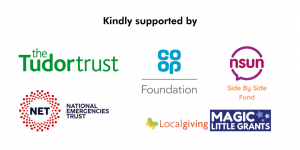In this blog, Lisa shares fantastic advice for coping with loss. Having recently completed a diploma in grief and bereavement counselling, she shares her experience and what she has found helpful along the grief journey.
I think most of us who have been bereaved have found ourselves in a situation where someone has said “I know how you feel” or something similar. The statement may be well intended, but from experience this seems to stir up emotions of anger, irritability, sadness and isolation.
How could someone possibly understand how you are feeling, let alone know how it feels to be experiencing the pain and loss that you are currently going through, no matter where you are on the grief journey?! Every person is unique and grief is a hugely personal thing; even two people who had the same relationship with the deceased, for example children grieving a parent, will have different grief experiences.
What is formal peer support?
While a peer support worker would not know exactly how you are feeling or ever say similar to the above, they draw on their own experiences to help the individual in a session. There are some similarities between counselling and peer support, such as active listening and empathy for the client. Counsellors are highly qualified people who have studied to gain their accreditation and they cover a range of issues. It is more common for peer support workers to share their experiences in appropriate circumstances in an effort to therapeutically bond and make the individual feel less alone. An example would be, if in a session the client shared they had lost their mother and the worker had experienced a loss themselves they could share and they could discuss how loss had effected them, thus leading the client to open up about how they are feeling.
My experience of peer support for grief
Peer support sessions are usually very informal; they rarely follow a strict schedule. The purpose of this is to allow the client to feel comfortable and bring to the session anything they want to talk about. Notes are taken after these sessions, primarily to keep a record of what has been discussed, these are confidential.
Peer support can be useful for some people, those who struggle to open up or those seeking validation for their feelings in particular. I had personal experience of peer support during a difficult period in my life. It was comforting to know even though they had not been through the same things, they showed compassion based on their own life. It allowed me to feel less alone during a turbulent time. This experience had a profound effect on me as I went on to do a similar job, working with those in mental health crisis.
Learning about different forms of grief and the impacts upon the bereaved has been eye-opening
The Covid-19 pandemic has had a devastating effect on us all and the world around us. I, like many others, have struggled with unemployment but I have done some studying and have recently completed a Diploma in Grief and Bereavement Counselling. I have learnt a lot on this course; some of which applies to my own grief and some which has helped me understand others. Learning about different forms of grief and the impacts upon the bereaved has been eye-opening.
Strategies I use
Even though everyone experiences grief differently, I have learnt some coping strategies that may help you in your loss; they have helped me in mine. Talking about your feelings around the loss and/or the deceased themselves can really help. Sharing can help you feel less isolated and also allows the person you are sharing with to know how to support you better. Talking about the person who has passed away can help you to process your feelings towards them and also keep their memory alive. Many people did not know what to say to me following loss and by opening myself up to talking about my feelings I was able to come to terms easier and it made things less awkward.
Writing is a useful tool in moving forward in grief. Some people keep a journal, diary, prose, poetry or any other creative writing. I find writing to be cathartic, to offload on paper what is going round in my mind. Another benefit to writing is that it is non-judgemental; you ca be as honest and raw as you want, no-one has to view it if you’d prefer it and you can even destroy it.
Celebrating your lost loved one can be an odd thought to many. Grief is associated with denial, anger, sadness and other negative emotions but there is no rule to say you can’t celebrate the deceased too; smiles and tears combined. Celebrating the life they had and the memories you shared can be just as beneficial. I host a small birthday celebration for a lost loved one each year and it helps me feel connected in a positive way.
There is no correct way to handle grief, it is unique to you. I hope this piece has offered some enlightenment about the sector of peer support and some coping mechanisms to help you through grief. If you are particularly struggling I would advise you to reach out to family, friends, GP, Let’s Talk About Loss or similar organisations that can offer support.
Lisa – Instagram @lisalou300692


